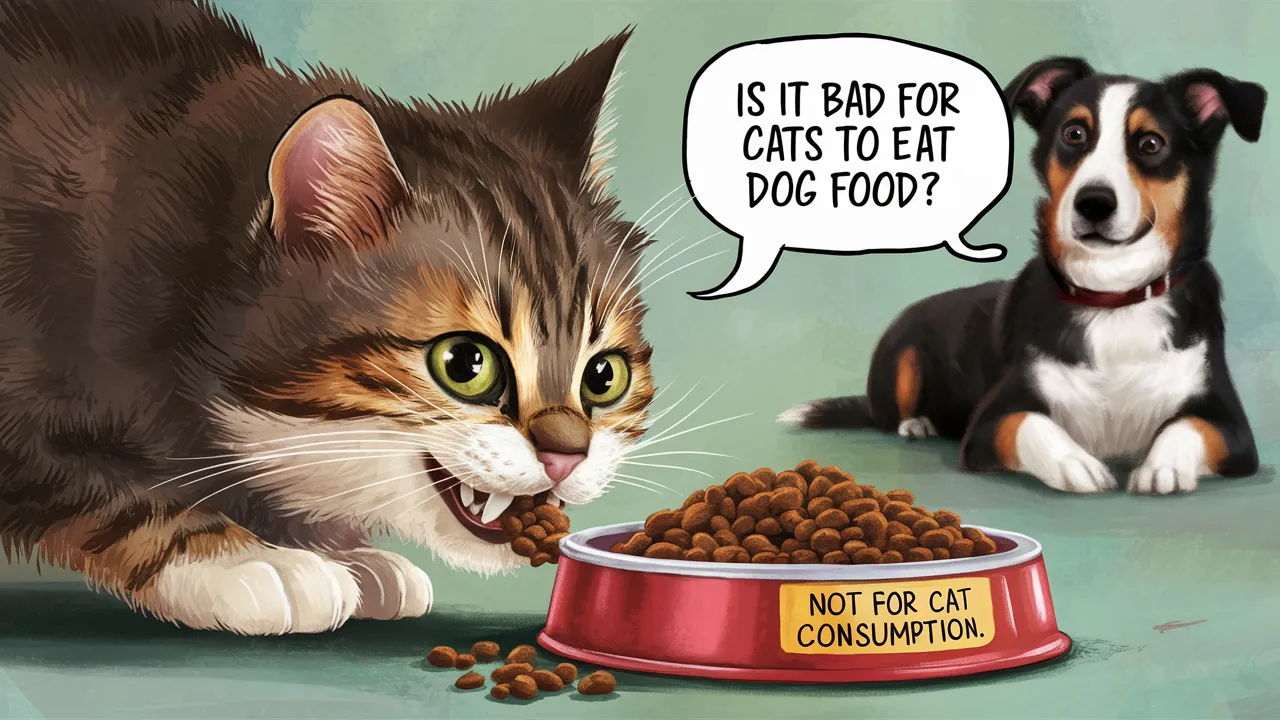Is It Bad For Cats To Eat Dog Food? Discover the nutritional differences between cat and dog food and the potential risks of feeding your feline friend canine cuisine with Infor Cats.
The Nutritional Differences Between Cat and Dog Food
Cats and dogs have different dietary needs, which is why their food is formulated differently. Here’s a breakdown of key nutritional differences:
Protein and Amino Acids
- Cats: Cats are obligate carnivores, meaning they require a high protein diet. They need a higher percentage of protein in their food than dogs, typically around 30-40%. This is because they need specific amino acids, like taurine, that are found in animal protein.
- Dogs: Dogs are omnivores and can digest a wider range of food, including plant-based proteins. They typically require a lower percentage of protein in their food, around 18-25%.
Taurine
- Cats: Taurine is an essential amino acid that cats cannot produce on their own. They need to get it from their diet.Taurine is crucial for heart function, vision, and reproductive health.
- Dogs: Dogs can synthesize some taurine, but it’s still important to provide them with adequate amounts in their diet.
Fat and Fatty Acids
- Cats: Cats require higher levels of fat in their diet than dogs. They also need specific fatty acids, like arachidonic acid, which are important for skin and coat health, as well as brain function.
- Dogs: Dogs can tolerate a lower percentage of fat in their diet.
Vitamins and Minerals
- Cats: Cats have specific requirements for certain vitamins and minerals, such as vitamin A, thiamine, and niacin.
- Dogs: While dogs also need vitamins and minerals, their requirements are slightly different from those of cats.

Is It Bad For Cats To Eat Dog Food?
It’s not ideal for cats to eat dog food, and it’s not recommended for their long-term health. While a small amount might not cause immediate harm, feeding your cat dog food regularly can lead to nutritional deficiencies and health problems.
Nutritional Deficiencies
Cats have unique nutritional needs that differ from those of dogs. They require higher levels of protein, specific amino acids like taurine, and certain fatty acids like arachidonic acid. Dog food, formulated for canine needs, may not provide adequate amounts of these essential nutrients.
Long-term feeding of dog food can lead to deficiencies in these crucial components, potentially causing:
- Heart problems: Taurine is essential for heart function in cats, and a deficiency can lead to heart disease.
- Vision problems: Taurine is also vital for healthy vision, and a deficiency can cause retinal degeneration and blindness.
- Urinary tract issues: Inadequate taurine can contribute to urinary tract problems.
- Skin and coat issues: A lack of arachidonic acid can cause dry, flaky skin and a dull coat.
Digestive Issues
Cats have shorter digestive tracts and different digestive enzymes compared to dogs. This means they may struggle to digest the ingredients in dog food effectively. This can lead to:
- Diarrhea: The high fiber content in some dog foods can cause diarrhea in cats.
- Vomiting: Cats may vomit if they have difficulty digesting the ingredients in dog food.
- Constipation: Some dog foods can be difficult for cats to digest, leading to constipation.
Health Problems
The combination of nutritional deficiencies and digestive issues can lead to various health problems in cats, including:
- Weight gain: Dog food may contain higher levels of fat and carbohydrates than cat food, which can contribute to weight gain.
- Obesity: Obesity can lead to other health problems, such as diabetes, heart disease, and joint problems.
- Increased risk of disease: Nutritional deficiencies can weaken the immune system, making cats more susceptible to diseases.
Choosing the Right Cat Food
Selecting the right food is crucial for your cat’s health and well-being. Here’s a guide to help you make informed decisions:
Factors to Consider
- Life Stage: Choose food formulated for your cat’s life stage: kitten, adult, senior.
- Health Conditions: If your cat has any health issues (e.g., urinary tract problems, allergies), choose a food specifically designed for those conditions.
- Ingredients: Look for high-quality ingredients, including real meat as the first ingredient. Avoid artificial colors, flavors, and preservatives.
- Nutritional Content: Ensure the food meets your cat’s specific nutritional needs, including protein, taurine, and essential fatty acids.
- Your Cat’s Preferences: Consider your cat’s taste preferences. Some cats prefer wet food, while others prefer dry food.
Consulting Your Veterinarian
Your veterinarian is the best resource for advice on choosing the right cat food. They can:
- Assess your cat’s individual needs: Your vet can consider your cat’s age, breed, activity level, and any health conditions.
- Recommend specific brands and formulas: They can provide personalized recommendations based on your cat’s unique requirements.
- Monitor your cat’s health: Regular checkups with your vet will help ensure your cat is getting the right nutrition and is healthy.
Conclusion
While cats can technically eat dog food, it’s not ideal for their long-term health.Cats have unique nutritional needs that differ from those of dogs, and dog food doesn’t meet these specific feline requirements. Long-term feeding of dog food can result in deficiencies in essential nutrients, leading to various health issues.

Related Post
What Is Carrageenan In Cat Food?
6 Types Of Ingredients To Avoid In Cat Food
Can Cats Eat Popcorn? Toxicity And Nutrition Information